After centuries of colonization and decades of scientific marginalization, an indigenous organization leads the global dialog on research of quinoa and other Andean grains, currrently considered superfoods and an answer to global food insecurity.
By Alan Adams with Nicolás Pichazaca
In June 2025, the world’s leading researchers, scientists, and producers of quinoa and other Andean grains will gather not in a modern conference center or university campus, but in the millenial ancestral lands of the Kañari Kichwa people in southern Ecuador. The IX World Quinoa Congress and Symposium on Andean Grains will mark the first time in the organization’s history that it will be hosted by an indigenous organization – the Association Mushuk Yuyay, marking a profound shift in who shapes the global conversation about this ancient grain.
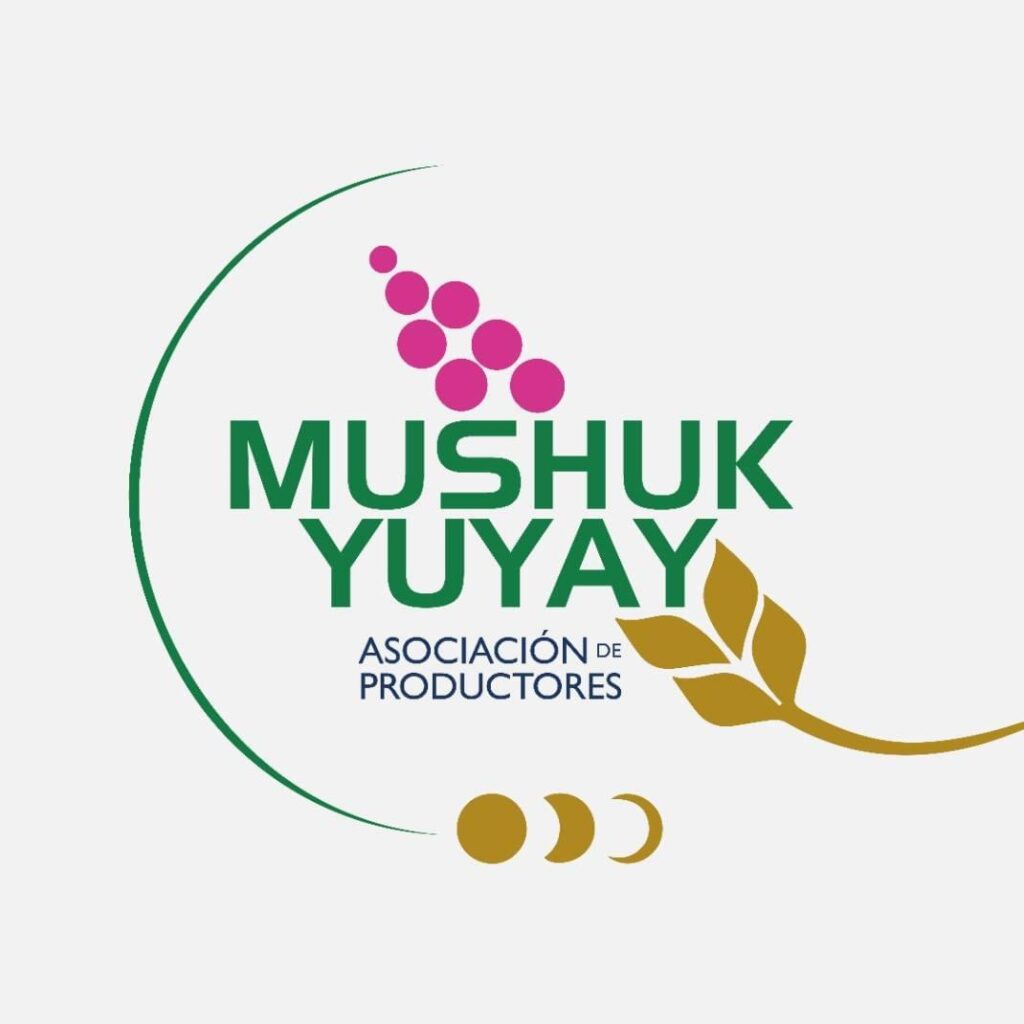
The congress’s theme, “TAWA INTI SUYU” (Four Regions Under the Sun), signals this transformation. While previous congresses focused primarily on scientific research and commercial applications, this gathering will weave together ancestral knowledge, cultural celebration, and modern science. Dance, music, and communal meals will share equal billing with research presentations and technical discussions.
This milestone emerged from a quiet moment at the 8th World Quinua Congress in Potosí, Bolivia, where three members of the Kañari Nation – representing Mushuk Yuyay as administrator, founder, and producer – shared their experiences of combining traditional farming practices with participatory research. Their presentation resonated so deeply that the congress organizers took an unprecedented step: inviting an indigenous farmers’ organization to host the next global gathering.
Para leer esta historia en Español ir a Una Primera Histórica: Indígenas del Pueblo Kañari Kichwa serán Anfitriones del IX Congreso Mundial de la Quinua y Simposio Internacional de Granos Andinos 2025.
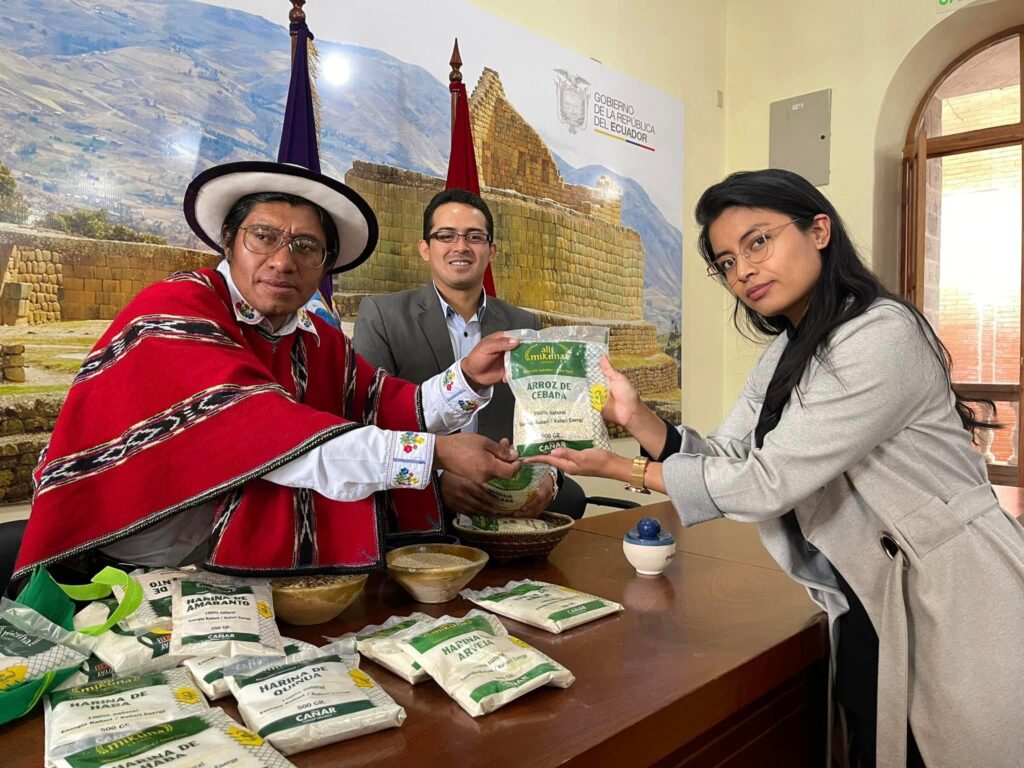
Making It Happen: The Road to the Congress
The path to hosting this historic congress traces back through generations of Kañari struggle for recognition. As José Buñay, a Kañari journalist during the agrarian reform, noted, Indigenous people were once considered mere “beasts of burden” – so degraded that they were forced to carry hacienda owners on litters and suffer insults if the ride was bumpy. The Kañari People lived with daily disrespect.
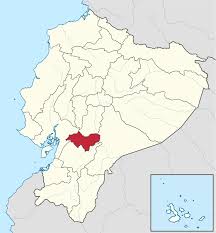
When Mushuk Yuyay announced their plans to host the congress, they encountered lingering skepticism about Indigenous capabilities, making support more complicated and requiring multiple meetings and complex negotiations at both provincial and national levels. Critics argued that the city of Cañar was too remote, suggesting the congress should move to a larger city.
When the organization insisted on showcasing traditional nutrition, one friend suggested lowering food costs by serving bologna on rolls; and another laughed and said that people were asking where the hamburgers were. But Mushuk Yuyay stood firm – nutrition is not a place to cut costs, they insisted, especially when consumer education is central to the congress. The members of Mushuk Yuyay arranged housing and transportation through negotiation with local governments throughout the province of Cañar, and local restaurants and hotels can be counted on to provide their services.
The financial hurdles proved particularly daunting. As a non-profit organization not yet breaking even on its Alli Mikuna ancestral food products, Mushuk Yuyay had to build support piece by piece. Through persistent negotiation, they secured backing from the international community development nonprofit TRIAS, whose directors recognized the congress’s importance to southern Ecuador’s economic, social, and ecological well-being. The McKnight Foundation, a long-time partner, added their support. Former Peace Corps Volunteers through Friends of Ecuador and donors via Global Giving contributed smaller but crucial amounts.
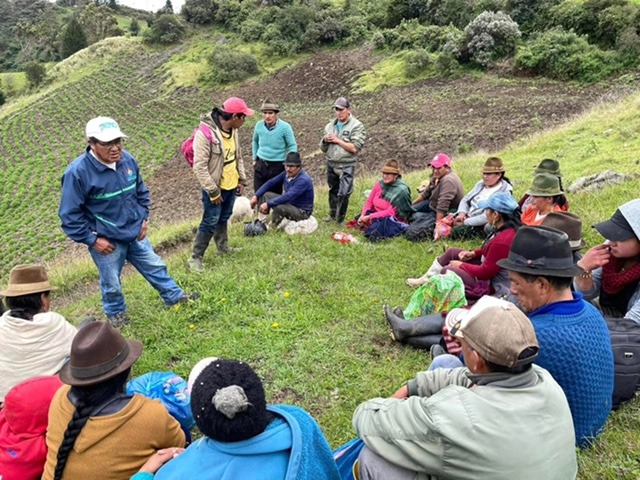
(Photo courtesy: Mushuk Yuyay)
The challenge echoes earlier struggles. During the agrarian reform of the 1960s, cooperative members had to find ways to pay for land despite earning just 15 cents a day as hacienda workers – when they were paid at all. They fought for education at a time when literacy was so rare that when cooperative members had to write their votes as Sí or No in Spanish or Ari or Mana in Kichwa – most could not.
But the Kañari People were determined to be educated so they could make their own decisions about their future. They could be their own technicians and experts. Now, there is universal secondary education in Kichwa and Spanish, and many hold advanced degrees.
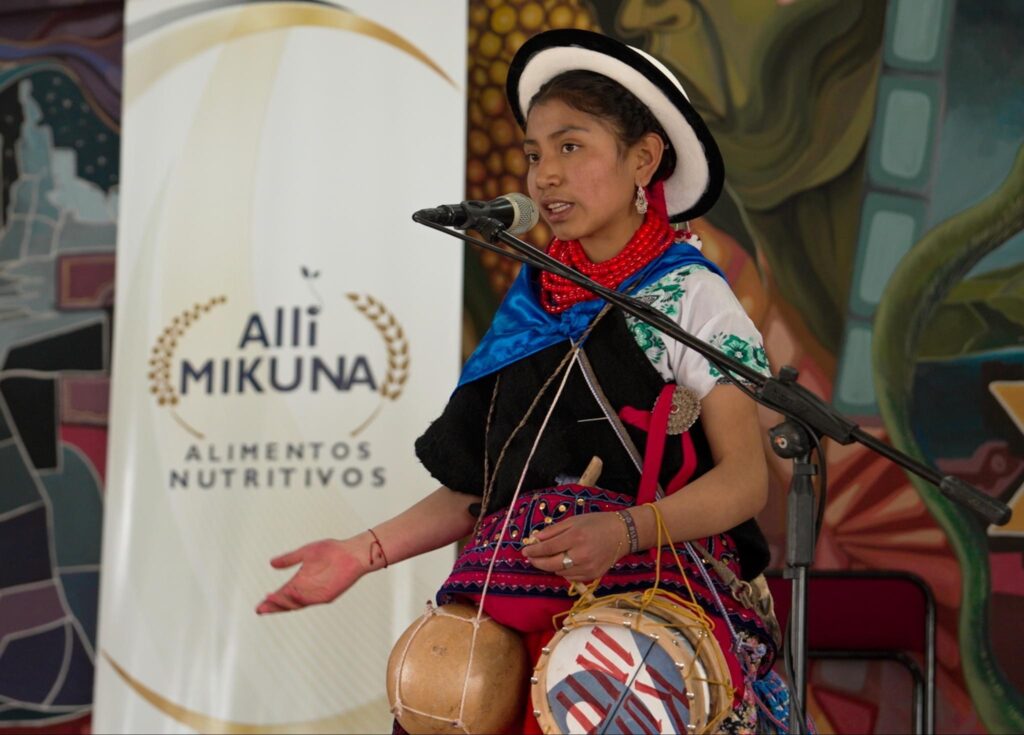
Through Zoom meetings, Mushuk Yuyay has brought together people who have never collaborated before, building partnerships with municipal, cantonal, and provincial governments, universities both national and international, and NGOs throughout the region. In the end, all financial support is investment, because this will bring economic stability to the area through increased production, sales of All Mikuna products, tourism, and other business that Mushuk Yuyay encourages through its product fairs. Economic stability will provide jobs and stem emigration. It will give hope for youth for a prosperous future at home.
Although there are no gifts. Every step toward hosting this congress, like every acre of land and measure of respect before it, has been hard-won. The most important lesson learned through this process mirrors what their predecessors discovered during the agrarian reform: they can do it. Despite doubts – even their own – they are accomplishing a feat as monumental as their ancestors’ struggle for land and respect.
A New Vision for Agricultural Science
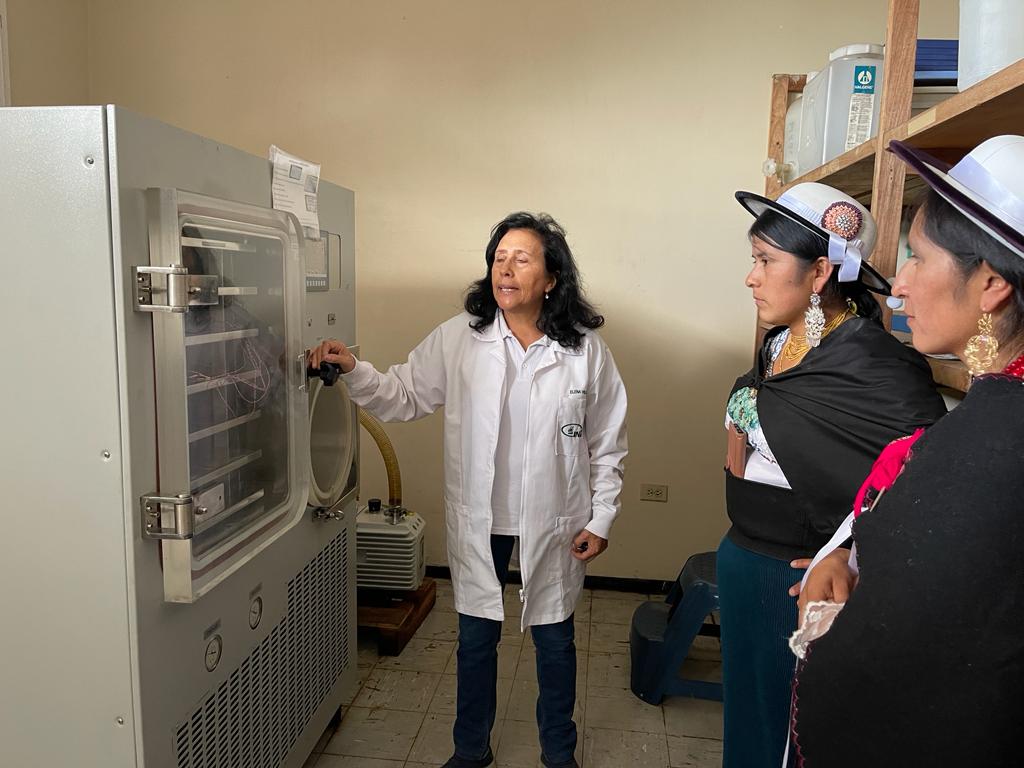
After analyzing food systems from local to international scales, Mushuk Yuyay designed a congress that breaks with tradition. While previous gatherings emphasized laboratory research and industrial applications, this meeting places indigenous foodways at the center. Conversations will explore how quinoa connects to food sovereignty, economic stability, and community solidarity.
“The Congress should continue to increase involvement of indigenous peoples and Andean communities, including their knowledge and perspectives on agriculture,” notes Fabiana Li of the University of Manitoba. “This would mean recognizing that quinoa’s value is not just economic”. That perspective infuses every aspect of the gathering. Participants will move between demonstration plots in Quilloac and the Mushuk Yuyay farm in La Posta, experiencing firsthand how traditional lunar and solar calendars guide planting cycles. They’ll explore how ancient techniques of crop rotation and intercropping adapt to modern climate challenges. A commercial fair at the Intercultural Bilingual Community Educational Center will showcase how cultural preservation and economic development can strengthen each other.
For the Kañari people, this congress represents more than scientific exchange – it demonstrates how indigenous communities can solve their own problems and design their own futures. The integration of traditional dance, music, and communal meals isn’t just cultural decoration – it’s a statement about how agricultural knowledge is passed down and shared.
This gathering in the steep mountains and deep valleys that the Kañari consider sacred marks a turning point. After centuries of having their agricultural expertise overlooked or dismissed, indigenous farmers are taking their rightful place as leaders in global agricultural science. The four regions under the sun now stretch far beyond what anyone could have imagined when the first World Quinua Congress convened in 2005.
Future Harvest
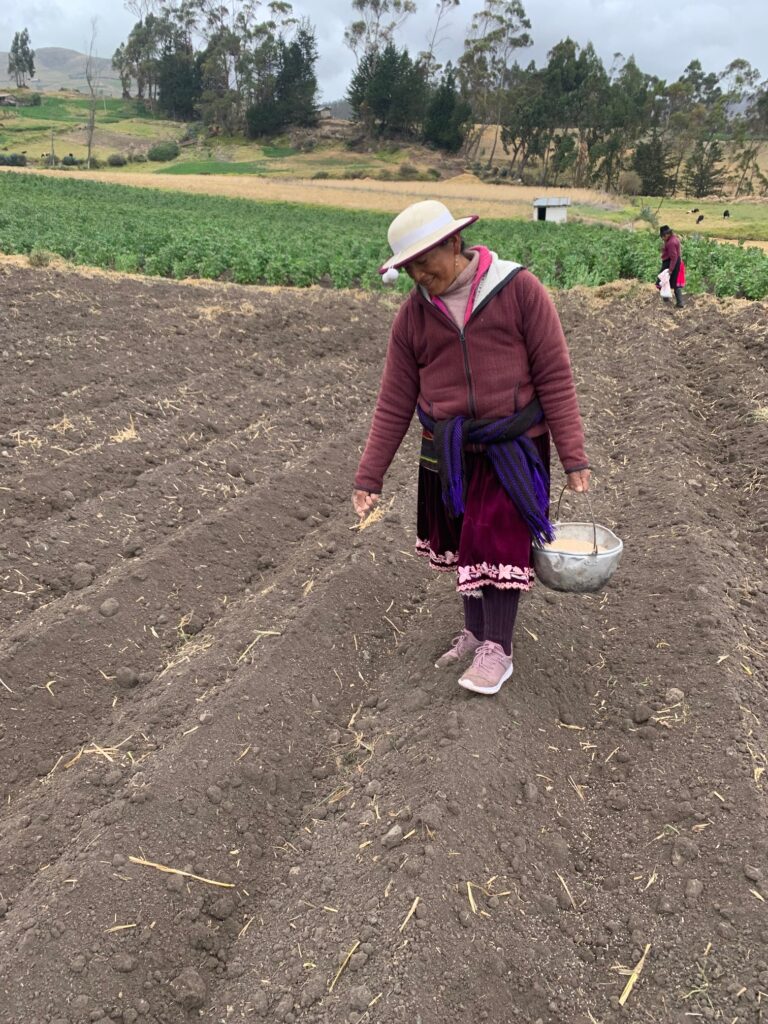
When Washington State University researcher Dr. Kevin Murphy speaks about showcasing their work at the congress, he’s not just referring to academic papers. The university’s collaboration with Mushuk Yuyay exemplifies a new model of agricultural research – one where scientists and farmers work together to develop quinoa varieties adapted to local conditions and cultural preferences. This participatory approach will be on full display during the congress, demonstrating how indigenous knowledge and modern science can strengthen each other.
“My hope for the Quinoa Congress in Ecuador is to shine light on the work that Indigenous communities, such as Mushuk Yuyay, are doing to preserve their food traditions, create value-added products and jobs through their agroecological and communal practices,” notes Christina Ocaña Gallegos, an Ecuadorian research technician at Washington State University and coordinator of the congress’s sponsorship search committee.
“In a world that sells convenience and takes your power away, it is an act of resistance to not succumb to industrial agriculture and processed foods, to keep growing the same crops you grew up eating without external reliance,” Ocaña added. “The Congress is a gateway into the reverence that this Cañari community has for Quinoa, a sentiment and respect that the whole world could use more of when it comes to our foods.”
This global event aims to make the Andean Kañari production system profitable with an agroecological and scientific approach; to generate employment in the local economy by training young producers and professionals focused on sustaining a healthy food culture through art and education; to reduce youth migration by organizing enterprises with a value chain approach* to the diversity of species cultivated in the territory; and finally, to strengthen and enhance the cultural matrix: valuing living community culture through research, production, systematization, and dissemination of different artistic literary, visual, scenic, musical, applied, cinematographic, and artisanal products.
The organizers expect participants from every continent, including scientists, businesspeople, and technicians interested in quinoa’s potential. There’s even discussion of quinoa in space exploration. But amid such forward-looking conversations, the congress keeps returning to fundamental questions: How can quinoa cultivation support food sovereignty? What role do ancestral grains play in confronting modern challenges like climate change and malnutrition? How can global interest in quinoa benefit rather than exploit indigenous communities?
These questions resonate far beyond Ecuador’s Cañar province. As the world grapples with food security, biodiversity loss, and climate change, indigenous agricultural knowledge offers tested solutions. This congress suggests a way forward: one where scientific advancement doesn’t come at the expense of cultural wisdom, where economic development strengthens rather than undermines community bonds, and where indigenous peoples lead the conversation about their own agricultural heritage.
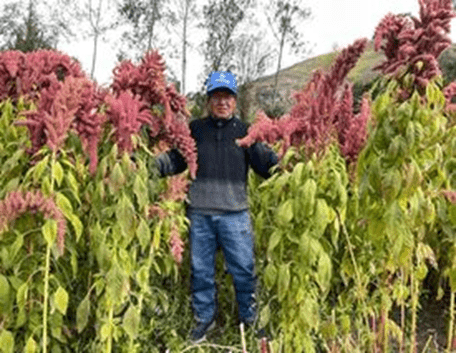
The IX World Quinua Congress marks not just a milestone for the Kañari people, but a model for how agricultural science might better serve humanity’s future – by honoring its past.
Source:
Buñay Yunga, Manuel. Juan José Buñay, su historia y su vida. Sept. 10, 2020.
* Value-chain approach to agricultural production: Taking a value chain approach to the diversity of species cultivated in a territory means to strategically analyze and improve all activities involved in bringing those diverse agricultural products from the farm to the consumer, with the goal of increasing competitiveness and generating wealth for everyone involved. See “Overview of the Value Chain Approach” from the USAID website, fortunately republished on MarketLinks.org.
- A Historic First: Indigenous Kañari to Host World Quinua Congress in Ecuador - February 11, 2025
- Heathy Children, Healthy Future in Ecuador - December 9, 2019
- Lino’s Dream - October 28, 2019
hi there, i am wondering about the dates of the conference in Kanari this year. I have seen here June ’25 and also came across info that stated sept ’25. Please provide me a current update. I live in Cuenca with a background in Conservation of Natural Resources (B.S. Agricultural Sciences, U.C.Berkeley) and would like to meet up with a local member of your group and plant to work as volunteer on this exciting project. I look forward to hearing from you, Thankyou!
Hi Janet! The answer is Septmenber, and I believe you have already received an official invitation by now from Alan and Nicolas. It is great to hear from you! Thank you for reading and corresponding with us!